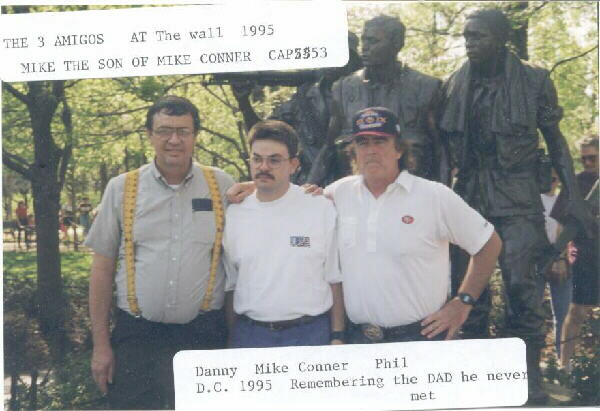|
By Sherrie Taylor QUAD CITY TIMES Sunday, May 28, 1995 WOODHUL, Ill. Memorial Day will hold a special meaning for former Woodhull resident Danny Russell. This year marks the 25th anniversary of one of his most painful memories of Vietnam, when he was shot down, not once, but twice. As a member of the U.S. Air Force, Russell's own plane was shot doen on a mission and then he was shot down again while in a rescue helicopter. It's been a long healing process since. But when he remembers his lost buddies Monday, it may be with less pain after having attended a special gathering last month. Russell, 47 whos now lives in Mendota, was shot down at 9:35 a.m. on April 22, 1970. At that exact time on April 22, 1995, Russell, his buddy, Phil Ehrhorn of Fremont California and the widow and son of another crew member, Michael Conner, all met at the Vietnam Veteran' Memorial Wall in Washington, D.C. The reunion of sorts wound up as a tearful and dramatic encounter for Russell and the others. "It was extremely moving," Russell said. "If you haven't seen the wall, pictures don't do it justice. The wall is alive. We held each other and cried as we located Michael Connor's name. "It was a trying time. All the air was out of our ballon and we felt deflated. But as we remembered the good times, we got pumped back up. |

Danny Russell, left, Michael Conner Jr., and Phil Ehrhorn share time at the Vietnam Veteran's Memorial in Washington, D.C.
|
|
April 22, 1970
Russell was injured in the crash that killed Connor. Russell fractured his back and also had shrapnel wounds in the face. Russell, a Morse code radio-control operator, was in a plane that had been in the air since 3 a.m. |
blank black line "As we sat back down, (Conner) took the seat where I had been sitting and I took his," Russell said. "And as the pilot ditched the plane in a canopy of trees, my buddy was killed. I'll never know why that happened. But I figure God's got a purpose and I'll find out what it is. "As we prepared to crash into the trees, I recalled that in all the crashes I knew about, there were no survivors. In fact, the plane that followed us, radioed back to the base there weren't survivors. But our radio man radioed back and said to come in and get us." Planes converged on the area to provide cover so a helicopter could come in and rescue the men. He said Viet Cong were coming in, but two guys were able to get in one helicopter and |
blank black line blank black line two more found their way to a second. "I was the only one left on the ground," Russell said. "When I finally got off the ground, the ground fire shot the rotor off the helicopter at about 20 feet up, altogether. It wasn't a good day." Another helicopter came in and dropped Nalpalm close to where they were dug in and 250 airborne troops were brought in to facilitate the rescue. Eventually, he got out. After crew members recovered from their injuries, they set up a scholarship fund for Conner's son, Michael Conner, Jr., who was born May 22, 1970. It was Conner's son and widow who Russell met at the memorial wall.
Coming home
|
blank black line blank black line "When I was injured, I wrote to my dad at his place of business so he could decide how best to tell my mom. Everything was classified, so the situation was difficult. But the hardest part was writing a letter to my buddy's widow." Russell was thrilled to be able to come home. "It was midnight when we got into town, so we had a one-car parade with a lot of horn honking. I was just so happy to be home. I was all I needed," Russell recalled. Once home, Russell was able to avoid most of the war protesters, but he did harbor resentment for those who dodged the draft. He now works at a lumber yard in Mendota and has two children. Russell's parents, Don and Lillian Russell, are deceased. Serving in the war seemed |
to be the right thing to do, Russell said. "I always felt if someone in authority told you to do something, you did it," he said. "My grandfather and father fought in World War I and II, so I felt this was something I should do. "It was a growing experience and I'd advise anyone to take their service tiem. At the time, I thought I was doing a worthwhile job. But I felt the loss of my buddies was for nothing, the way it turned out. I's not bitter, though, and I never have been," he said. "My values changed so much over there. Little things mean so much more. The things we are confronted with now seem so senseless... Life is so precious." |